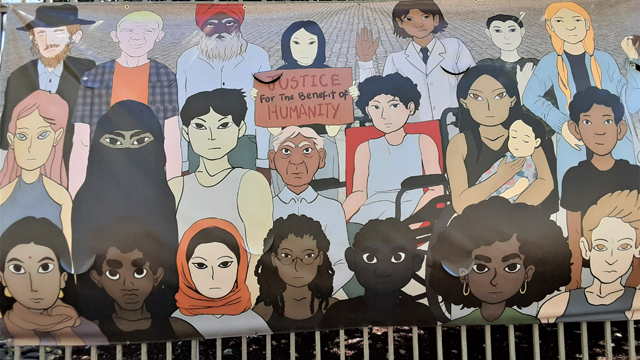
A Time of Highs and Lows for the Indian-American Community
Their thoughts are on two continents…
[dropcap]W[/dropcap]alking along a Manhattan street, I came across a powerful mural outside a university, a tapestry of brown, white and black faces unified with the words, ‘Justice for the benefit of humanity’ – and it seemed to really ring true in a city which has seen so much trauma in the past year and is now finally getting it right.
After the nightmare of 2020, of four years of a harsh administration and the harsher realities of the COVID pandemic, Indian-Americans have got a respite with the Biden-Harris win, and with their community finally getting a place at the table with a record number of Indians being selected for high-profile posts in the new administration.
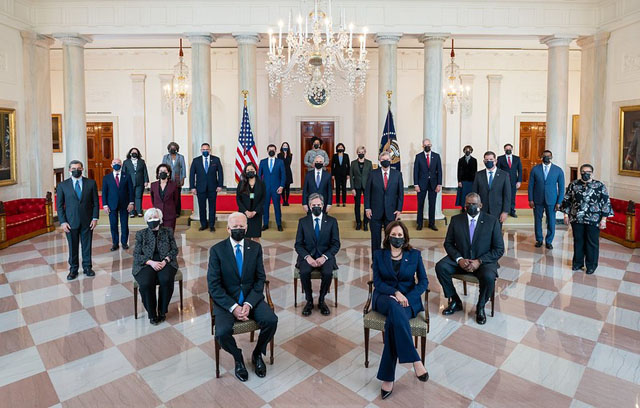
[dropcap]W[/dropcap]ith 150 million relief checks going out to hard-hit Americans and over 200 million shots in their arms, things finally are moving in the right direction. Yet every day there seems to be a new twist – with constant Asian hate crimes, gun violence, immigration ups and downs and the pandemic’s stresses on life and the economy.
On April 25th we had the horrific mass shootout in the FedEx facility in Indianapolis with 8 deaths, four of them being Sikhs. Was it a hate crime? The community grieved for the loss of hard-working immigrants, gunned down perhaps simply for being different.
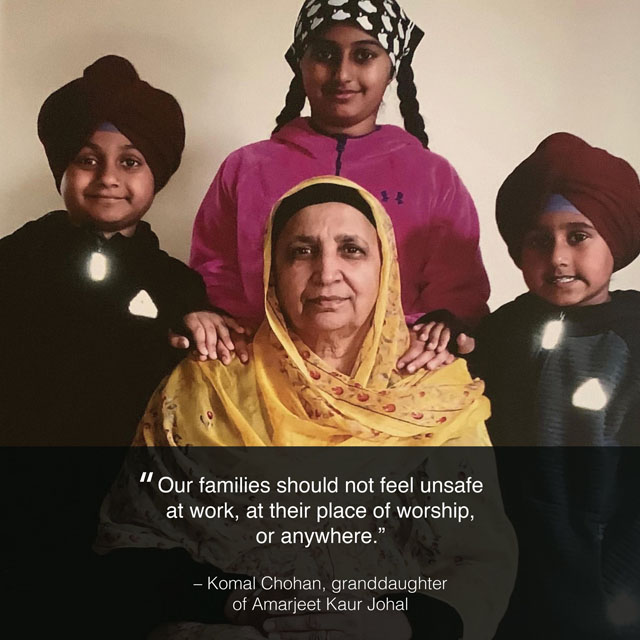
[dropcap]A[/dropcap]s Komal Chohan, the grand-daughter of one of the victims Amarjeet Kaur Johal, shared: “I am heartbroken to confirm that my naniji (maternal grandmother), Amarjeet Kaur Johal, is among those killed in the senseless shooting at the FedEx facility in Indianapolis… I have several family members who work at the particular facility and are traumatized.
My nani, my family, and our families should not feel unsafe at work, at their place of worship, or anywhere. Enough is enough–our community has been through enough trauma.”
According to Amrith Kaur, Legal Director of The Sikh Coalition, an advocacy group: “To be clear, at this time, whether bias was one of the motivating factors in this horrific attack is still under investigation and we expect all factors to be taken into account. However, in the 20 years since our organization was founded, we have seen Sikhs targeted by hate-motivated violence all too often.
“In this case, given the shooter’s knowledge of this particular facility having a large number of Sikh employees combined with his propensity for violence—a fact law enforcement was well aware of from last year when they were called to his home and confiscated an assault rifle—it is critical that they consider those facts in their investigation.”
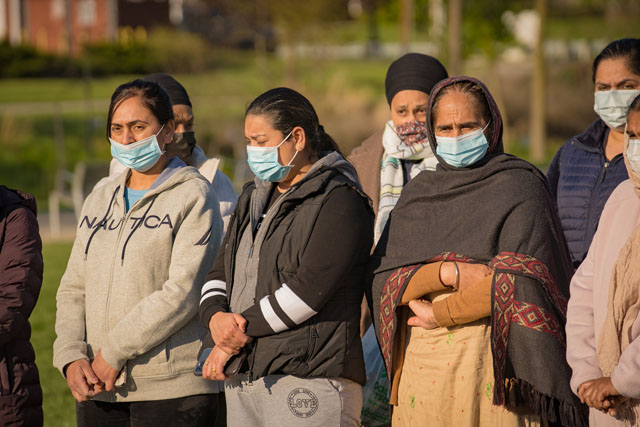
[dropcap]T[/dropcap]here certainly is a more conducive atmosphere to seeing that justice is done. The recent mass shooting of six Asian women in Atlanta set off protests not only by Asian-Americans but the larger American populace, and resulted in swift action.
As Vice-president Kamala Harris noted, “I applaud the Senate and the Congressional Asian Pacific American Caucus for passing the COVID-19 Hate Crimes Act — and for bringing us closer to achieving justice and equality for the AAPI community. Acts of hate against Asian Americans are wrong, un-American, and must stop.”
Shekar Narasimhan, Chairman and Founder of the AAPI Victory Fund, a SuperPAC focused on mobilizing the political power of the Asian community, says that along with these important changes, Asian-Americans must attack the roots of ignorance about their community and the fact that they have suffered discrimination in America for over a hundred years.
“I feel like we’ve turned the corner but we do have issues on the streets every day,” he says. “There has been fear and anxiety but we’ll get through it and know what the solutions are and work on them. You can’t solve a problem which has been around for a hundred years in six months or a year. It takes time.”
One tactic has been to get Asian emerging leaders into the civic life of America, so people see them as full-fledged Americans: AAPI is endorsing two rising stars who are running for mayor – Michelle Wu in Boston and Aftab Pureval in Cincinnati.
[dropcap]A[/dropcap]nother big relief for traumatized Americans this year was the much-awaited verdict in the George Floyd murder trial where a resounding verdict of ‘Guilty’ on all three counts – second degree murder, third degree murder and second degree manslaughter – showed that blacks and minorities could get justice in America.
As President Biden observed: “It was a murder in the full light of day, and it ripped the blinders off for the whole world to see the systemic racism that is a stain on our nation’s soul; the knee on the neck of justice for Black Americans; the profound fear and trauma, the pain, the exhaustion that Black and brown Americans experience every single day.”
VP Kamala Harris introduced the George Floyd Justice in Policing Act with Senator Cory Booker and Rep. Karen Bass in Congress and this bill will hold law enforcement accountable and build trust with the community.
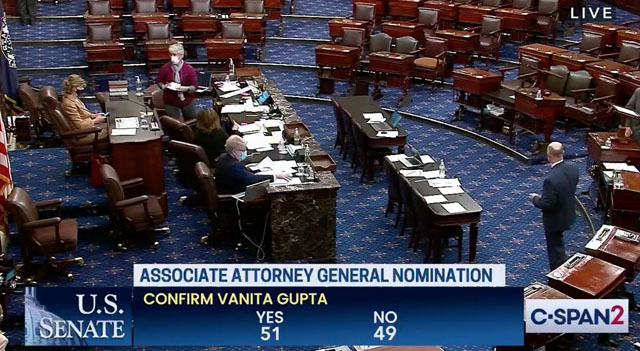
[dropcap]A [/dropcap]bright spot for rendering justice is also the hard-won confirmation of civil rights activist Vanita Gupta as deputy attorney general. With Attorney General Merrick Garland and Vanita Gupta at the helm, there is hope for a more fair and just America with reforms in the criminal justice system. After leaving the Justice Department at the end of the Obama administration, Gupta spent the past four years as the president and CEO of the nonprofit Leadership Conference on Civil and Human Rights.
The racial inequity had earlier been seen in the disparity of Covid treatments and is being addressed with vaccinations to populations across the board. When Biden had taken office, only 8 percent of people over 65 had received their first shot – now the total exceeds 80 percent of people over 65.
As of now, anyone over the age of 16 can be vaccinated. While different states have different levels of success, according to the CDC tracker, over 232,407,669 people have already been vaccinated. Said Biden, “This is an American achievement; a powerful demonstration of unity and resolve – what unity will do for us; and a reminder of what we can accomplish when we pull ourselves together as one people to a common goal.”
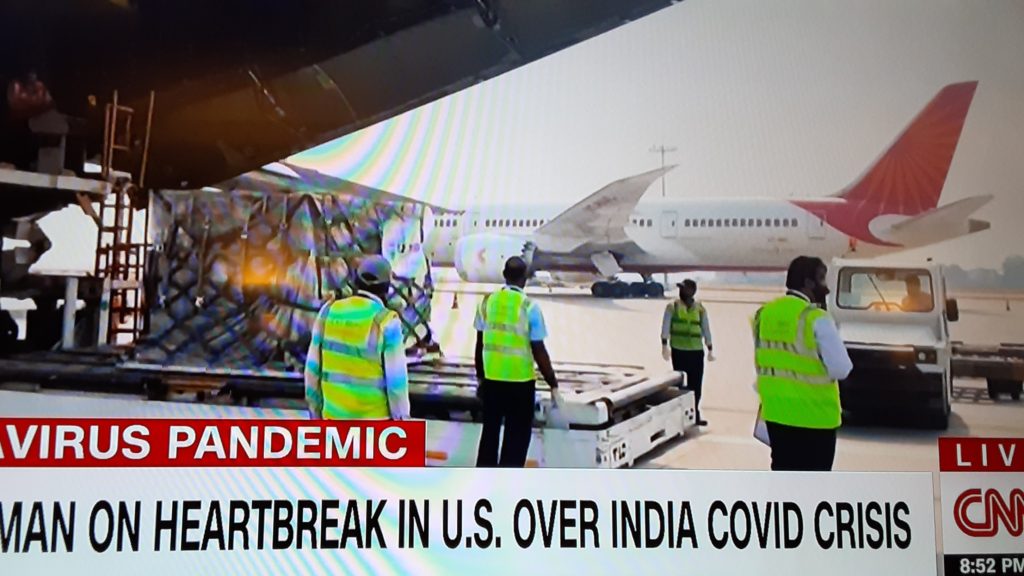
[dropcap]A[/dropcap]s the virus situation has come under control with a large portion of the population already vaccinated, the sadness for Indian-Americans is the heartbreaking situation which has developed in the homeland. Their emotions are simultaneously on two continents and both organizations and individuals are working on many levels to get assistance to India. Several Indian-American organizations including Indiaspora, SEWA, and AIF are contributing funds and equipment to India, and community leaders have put their voices to the Administration for assisting India.
Biden spoke with Prime Minister Narendra Modi and shared this with Americans, “I pledged America’s full support to provide emergency assistance and resources in the fight against COVID-19. India was there for us, and we will be there for them. Just as India sent assistance to the United States as our hospitals were strained early in the pandemic, we are determined to help India in its time of need.”
Rep. Raja Krishnamoorthy says, “The Biden Administration’s commitment to export raw materials needed for life-saving vaccines to India is an essential first step, but we must double down by also shipping AstraZeneca vaccine doses, oxygen concentrators, and other supplies in our stockpiles not being used.”
While the Biden Administration has been responsive to India, Indian-Americans have also done their bit in seeing that India gets timely help. Milan Vaishnav, Director @CarnegieSAsia tweeted, “I was asked today whether the Indian Diaspora is responsible for the U.S. response to the COVID crisis. I’m not sure they changed the response, but I do think they changed the *pace* of the response. They used their voice, worked the phones, and mobilized in a big way.”
(This first appeared in my weekly column ‘India in America’ in CNBCTV18.com)
Related Articles
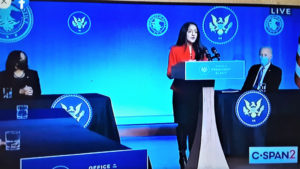
In Joe Biden’s Justice League – Vanita Gupta’s Challenging new role
